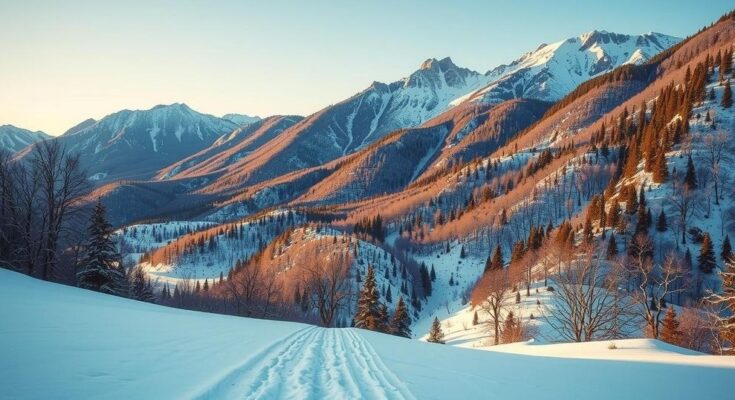A recent report from Climate Central indicates that the Mountain West region is experiencing a reduction in winter days due to climate change, with areas such as Arizona, New Mexico, and Nevada losing an average of ten days annually. States at higher altitudes like Wyoming and Colorado are experiencing lesser reductions. The implications of these changes pose risks to ski resorts, ecosystems, and water supplies, necessitating urgent attention to climate impact.
This winter, residents of the Mountain West can expect to witness a reduction in winter days, with predictions indicating a decrease of between two to ten days caused by climate change. Climate Central’s recent report highlights the alarming trend of fewer days with below-freezing temperatures, particularly impacting states such as Arizona, New Mexico, and Nevada, which have experienced an average loss of ten days each year. Due to their naturally warmer climates, these areas are disproportionately affected by even minor increases in temperatures.
Conversely, states at higher altitudes, like Utah, Colorado, Montana, and Wyoming, are experiencing lesser reductions in winter days. Wyoming, for example, reflects a modest average loss of two days; however, as noted by Kristina Dahl, vice president of science at Climate Central, these regions still face warming but remain below the critical threshold necessary for significant winter day loss. Idaho and Colorado also report an average decline of four winter days.
As this trend persists, ski resorts may face substantial implications, potentially necessitating a shorter operational season. Additionally, ecosystems could suffer, with early blooming flowers lacking necessary pollinators, thereby jeopardizing crop sustainability. The reduction of snow also poses threats to water supply, critical for both human and environmental needs.
This report underscores the pressing need for climate awareness and action as the Mountain West adapts to shortening winter seasons.
The Mountain West region is undergoing significant changes in its winter climate patterns, primarily due to the impacts of climate change. As temperatures rise, the number of winter days is anticipated to decline, particularly affecting those living in lower-altitude states. Research shows that the trend is not uniform across the region, with varying levels of impact depending on altitude and geographic location. Ski resorts, agriculture, and local ecosystems are all at risk due to these climatic shifts, necessitating a closer examination of both current conditions and future projections.
In conclusion, the findings presented by Climate Central illustrate a concerning trend in the Mountain West, where climate change is leading to a reduction in winter days. While lower-altitude states face significant losses, higher-altitude areas are not immune to the effects of warming. This situation poses risks not only to recreation and tourism but also to ecosystems and water supplies. As such, it is vital for stakeholders to acknowledge and respond to these environmental changes proactively.
Original Source: www.upr.org




